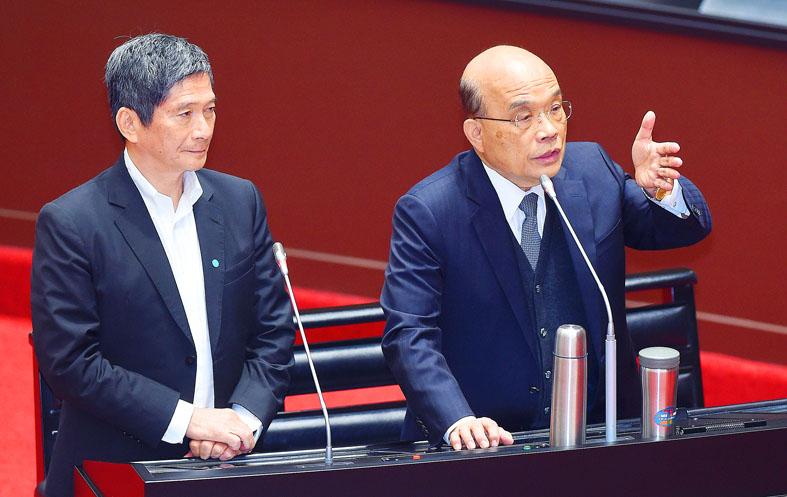Premier Su Tseng-chang (蘇貞昌) yesterday urged the public to stand up against China’s human rights contraventions, after some Taiwanese celebrities joined Beijing’s boycott of clothing brands that expressed concern over allegations of forced labor on cotton plantations in China’s Xinjiang region.
China’s state-owned media have called on the Chinese public to boycott foreign firms including Hennes & Mauritz AB (H&M) and Nike Inc following sanctions by Western governments over the mass internment of Muslim Uighurs.
In response, several Taiwanese entertainers have withdrawn their endorsements from the brands targeted by Beijing.

Photo: Liao Chen-huei, Taipei Times
During a plenary session at the legislature yesterday, Democratic Progressive Party Legislator Rosalia Wu (吳思瑤) asked Cabinet officials to comment on the celebrities.
She said Ouyang Nana (歐陽娜娜), Janine Chang (張鈞甯) and Greg Hsu (許光漢) were among those who joined the Beijing-directed boycott of “all speech and action that slandered China.”
In response, Su said that “some people have no sense of propriety. Their actions were selfish and showed a lack of understanding for the importance of human rights.”
Although the entertainers’ behavior was against Taiwan’s “national interest and disrespectful of human rights,” Taiwan is a country based on rights, and the government would not take action against offensive, but otherwise legal speech, he said.
“I call on the public to speak on behalf of human rights, and to work toward advancing human rights in the world,” Su said.
Chinese Nationalist Party (KMT) Legislator Lee De-wei (李德維) asked Su if the government has plans to sanction imports of cotton from Xinjiang.
Su said that while Executive Yuan agencies have not proposed any plans yet, “I have fought for human rights all my life and my belief is that we should boycott anything and anyone who contravenes human rights.”
Taiwan’s transformation into a democracy took years and was due to the effort of multiple generations of Taiwanese, and the nation must condemn oppression wherever it occurs, he said.
If Taiwan imposes sanctions, the government would select policies that achieve the best results for the country, Su said, adding that Taiwan should not be left behind when other human rights-respecting democracies are boycotting Beijing for its abuses.
“Human rights are universal values and an expression of civilization,” Minister of Culture Lee Yung-te (李永得) said.
China’s human rights abuses are severe, and Taiwan should stand with the world in condemning and sanctioning it, he said.
Lee called on the entertainers to look at the world from the perspective of values and not commercial profit, which have led them to give endorsements to a government that disrespects human rights.
Concerning sanctions, Wu said she believes that the government should take a more active role and not just ask the public to boycott cotton from Xinjiang.
The Executive Yuan could exclude cotton from the region and other products associated with human rights abuses from government procurement, and ask socially responsible businesses to boycott products made by forced labor, she said.
“This is an opportunity for Taiwan’s textile industry to enter the global market. Should major countries propose a total ban [on cotton from Xinjiang], we should consider joining it,” she said.

CHAOS: Iranians took to the streets playing celebratory music after reports of Khamenei’s death on Saturday, while mourners also gathered in Tehran yesterday Iranian Supreme Leader Ayatollah Ali Khamenei was killed in a major attack on Iran launched by Israel and the US, throwing the future of the Islamic republic into doubt and raising the risk of regional instability. Iranian state television and the state-run IRNA news agency announced the 86-year-old’s death early yesterday. US President Donald Trump said it gave Iranians their “greatest chance” to “take back” their country. The announcements came after a joint US and Israeli aerial bombardment that targeted Iranian military and governmental sites. Trump said the “heavy and pinpoint bombing” would continue through the week or as long

TRUST: The KMT said it respected the US’ timing and considerations, and hoped it would continue to honor its commitments to helping Taiwan bolster its defenses and deterrence US President Donald Trump is delaying a multibillion-dollar arms sale to Taiwan to ensure his visit to Beijing is successful, a New York Times report said. The weapons sales package has stalled in the US Department of State, the report said, citing US officials it did not identify. The White House has told agencies not to push forward ahead of Trump’s meeting with Chinese President Xi Jinping (習近平), it said. The two last month held a phone call to discuss trade and geopolitical flashpoints ahead of the summit. Xi raised the Taiwan issue and urged the US to handle arms sales to

BIG SPENDERS: Foreign investors bought the most Taiwan equities since 2005, signaling confidence that an AI boom would continue to benefit chipmakers Taiwan Semiconductor Manufacturing Co’s (TSMC, 台積電) market capitalization swelled to US$2 trillion for the first time following a 4.25 percent rally in its American depositary receipts (ADR) overnight, putting the world’s biggest contract chipmaker sixth on the list of the world’s biggest companies by market capitalization, just behind Amazon.com Inc. The site CompaniesMarketcap.com ranked TSMC ahead of Saudi Aramco and Meta Platforms Inc. The Taiwanese company’s ADRs on Tuesday surged to US$385.75 on the New York Stock Exchange, as strong demand for artificial intelligence (AI) applications led to chip supply constraints and boost revenue growth to record-breaking levels. Each TSMC ADR represents

State-run CPC Corp, Taiwan (CPC, 台灣中油) yesterday said that it had confirmed on Saturday night with its liquefied natural gas (LNG) and crude oil suppliers that shipments are proceeding as scheduled and that domestic supplies remain unaffected. The CPC yesterday announced the gasoline and diesel prices will rise by NT$0.2 and NT$0.4 per liter, respectively, starting Monday, citing Middle East tensions and blizzards in the eastern United States. CPC also iterated it has been reducing the proportion of crude oil imports from the Middle East and diversifying its supply sources in the past few years in response to geopolitical risks, expanding